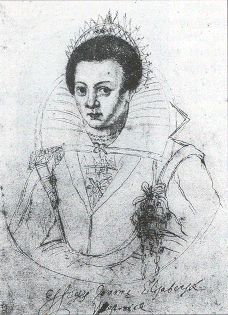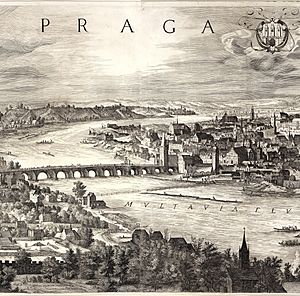Elizabeth Jane Weston facts for kids
Elizabeth Jane Weston (also known as Elisabetha Ioanna Westonia in Latin, and Alžběta Johana Vestonie in Czech) was a remarkable poet. She was born in England in 1581 or 1582 and later lived in Prague, where she passed away on November 23, 1612. Elizabeth was famous for her poems written in Neo-Latin, which was a modern form of Latin used by scholars. It was very unusual for a woman during her time to have her poetry published, but Elizabeth achieved this special recognition.
Contents
Her Life and Early Years
Elizabeth was born in Chipping Norton, Oxfordshire. Her mother was Joanna Cooper. Elizabeth's father, John Weston, died when she was only six months old. Soon after, her mother married Edward Kelley, who was an English alchemist. An alchemist was someone who tried to turn ordinary metals into gold. The family then moved from England to Prague, which is now in the Czech Republic.
Edward Kelley's work as an alchemist caught the attention of Emperor Rudolf II, who supported his projects. Elizabeth grew up in a supportive home. Her parents believed that all their children, boys and girls, should get a good education. Elizabeth's stepfather hired a Latin teacher for her, and she even attended university lectures. She learned many languages, including Czech, English, German, Italian, and Latin.
Later, her family faced difficulties. Her stepfather, Edward Kelley, lost the emperor's favor and was put in prison. Elizabeth wrote letters to the emperor's court to try and help him. We don't know how much her letters helped, but she tried her best.
In 1603, Elizabeth married a lawyer named Johannes Leo. They had seven children together.
Elizabeth's Amazing Work
Elizabeth's writing impressed many scholars because she was so skilled in Latin poetry and prose. She became friends with two nobles from Silesia, Georgics Martinius Von Baldhoven and Nicolas Maius. Baldhoven strongly encouraged Elizabeth to publish her work.
In 1602, Baldhoven paid his own money to publish Elizabeth's first book, called Poemata. This book had two parts. It included poems about people who had died, peaceful nature poems, and poems written to Emperor Rudolf II. She also wrote poems about herself.
In 1606, her second book, Parthenicon Libri III, was published. This title means "maidenly writings." It had three parts and included short, clever poems, sad poems, letters asking for help from officials, and poems about a big flood in Prague. It also featured fables, which are short stories with a moral lesson, like those by Aesop. A large part of this book was an exchange of letters written by and to Elizabeth.
Elizabeth became well-known as one of the best Neo-Latin poets of her time. It was especially remarkable that her work was published under her own name. Her writing covered many topics, including everyday life, classical stories, myths, history, and special occasion poems. She also wrote about qualities often expected of women, like being pure and modest.
Her Impact on Others
During her lifetime, many important thinkers across Europe admired Elizabeth's poetry. Jan Dousa, a Dutch scholar, was one of them. Years later, another famous writer, John Evelyn, praised Elizabeth. He said she was one of the best Neo-Latin poets, alongside Sir Thomas More.
Death and Lasting Memory
Elizabeth passed away in 1612. Records from that time say she died from an illness, not during childbirth. She was buried in St. Thomas' Church in Malá Strana, a beautiful part of Prague.
Elizabeth was often called Virgo Angla, which is Latin for "the English Maiden." Her collection of works is known as Westonia, which is also her Latin name.
 | Delilah Pierce |
 | Gordon Parks |
 | Augusta Savage |
 | Charles Ethan Porter |



